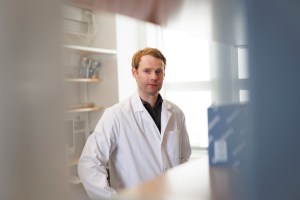Health
-
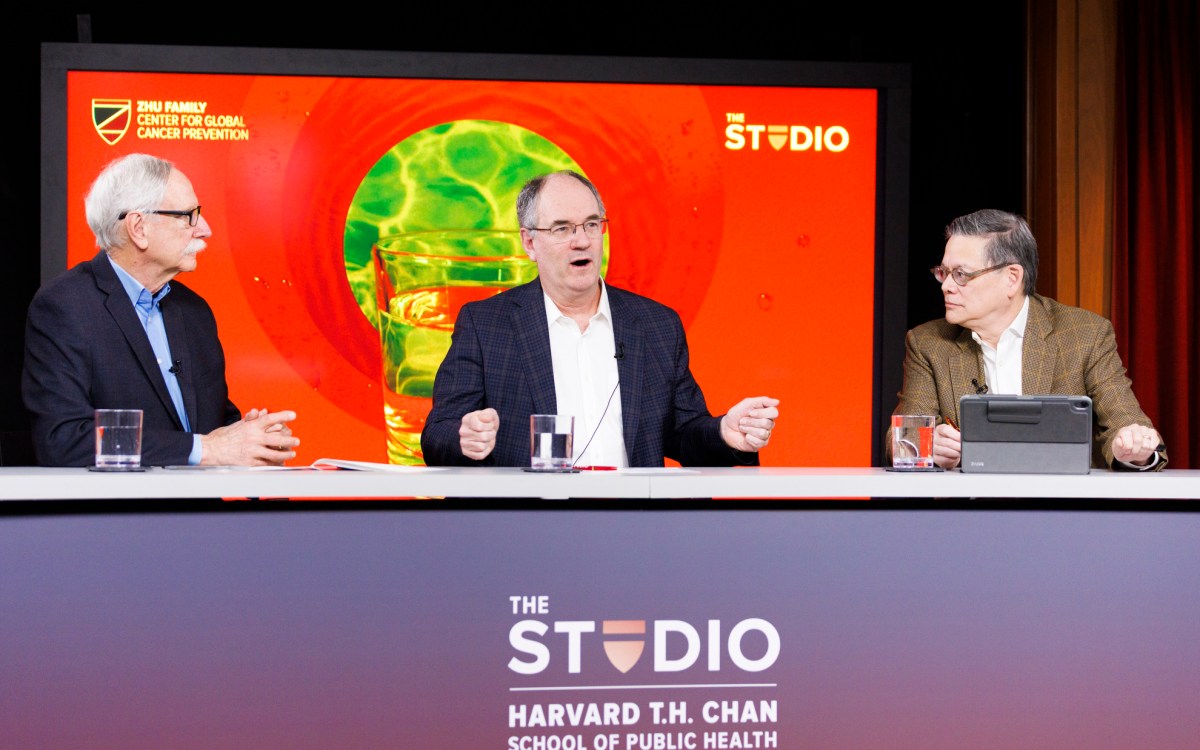
Which is worse, a soda or a beer?
Experts seek to clarify the health effects of alcohol and sugary drinks
-
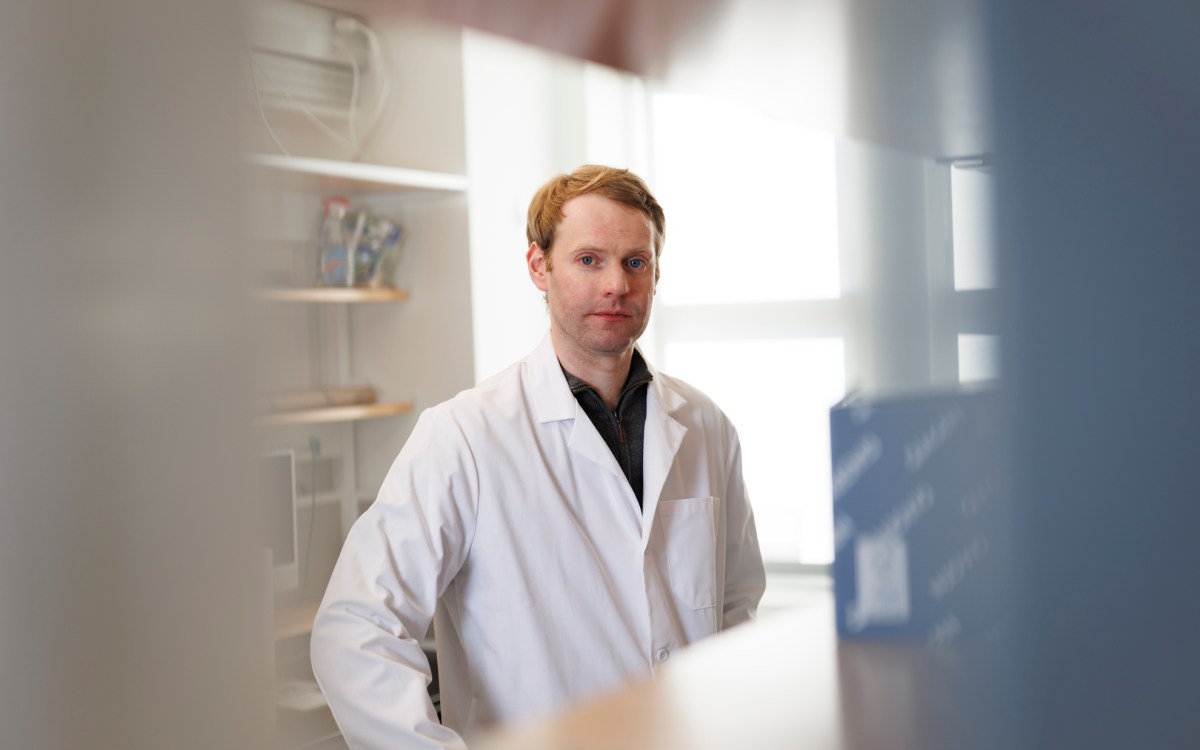
‘I think I know how to fix this.’
How a discovery in a Harvard lab is offering hope for patients with hard-to-treat heart disease

-
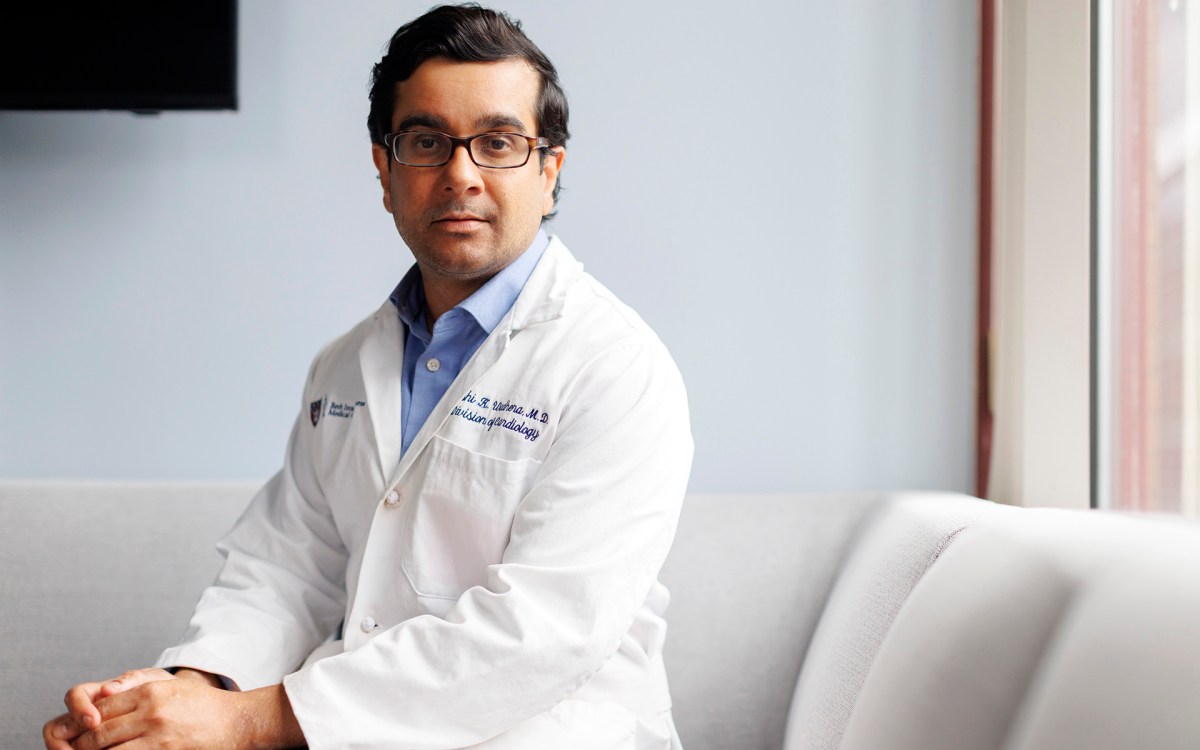
American heart health worsening
New statistical snapshot finds disappointing trend despite advances in treatment, ways to prevent nation’s leading cause of death

-
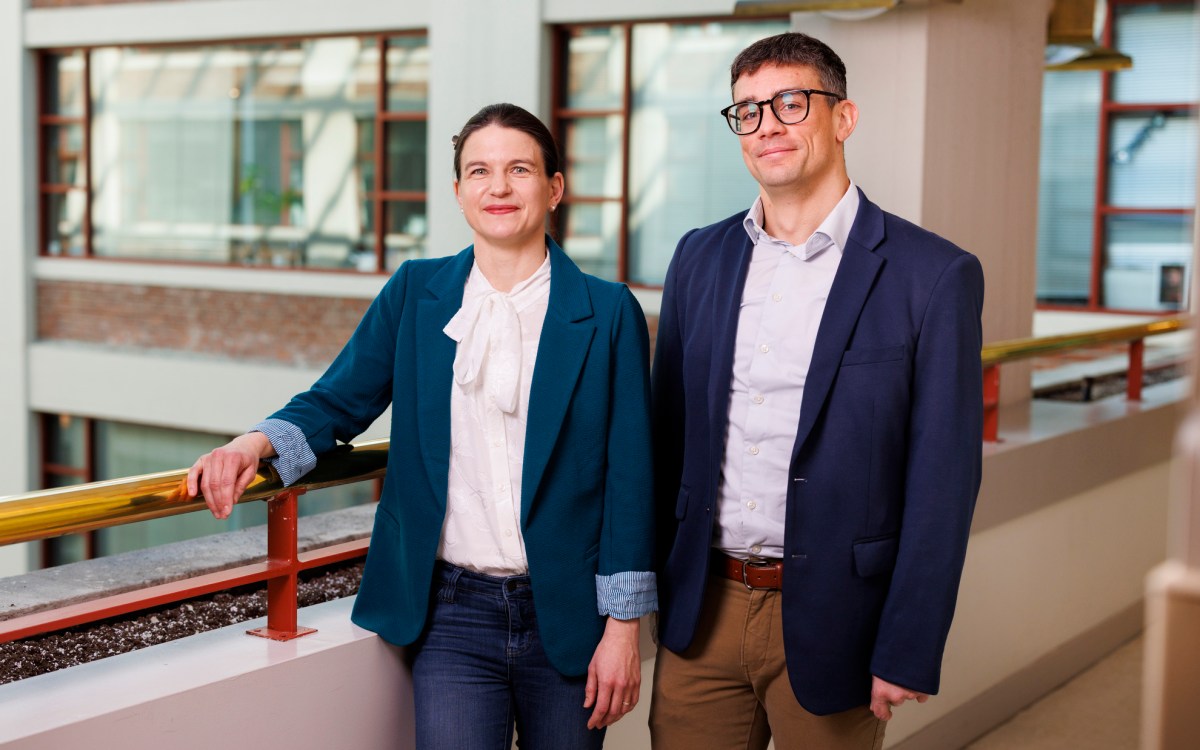
Tracking mysteries of loss of Y chromosome, cancer
Research suggests it may explain higher incidence, severity of some disease in men
-

How realistic is ‘The Pitt’?
Doctors weigh in on what hit TV show gets right and wrong about life in the ER — from pacing and caseloads to workplace culture (and that waiting room from hell)
-

Yoga can help cut severe, initial opioid-withdrawal period in half, study finds
Researchers say results could dramatically increase chances of recovery
-
Eradicating polio better option than control
Concerns about the high perceived costs of eradicating the relatively low number of polio cases worldwide have led to recent suggestions that it is time to shift from a goal of eradication to control: abandoning eradication and allowing wild poliovirus to continue to circulate, which proponents of control believe can sustain the low number of cases.
-
Root, root, root for the umpire
The roar of the crowd may subconsciously influence some referees to give an advantage to the home team, according to a study that examines the results of more than 5,000 soccer matches in the English Premier League. The matches were played between 1992 and 2006, and involved 50 different referees, each of whom had officiated at least 25 games within that time period.
-
Manipulating genetic switch in mice eases MD symptoms
Scientists at Dana-Farber Cancer Institute have shown in a laboratory study that revving up a crucial set of muscle genes counteracts the damage caused by a form of muscular dystrophy.
-
Finding the start of Alzheimer’s disease
Faces are hard to remember. Even harder are the names that go with them. It’s one of the most common problems people face as they get older.
-
Weight gain in pregnancy linked to overweight in kids
Pregnant women who gain excessive or even appropriate weight, according to current guidelines, are four times more likely than women who gain inadequate weight to have a baby who becomes overweight in early childhood. These findings are from a new study at the Department of Ambulatory Care and Prevention of Harvard Medical School (HMS) and Harvard Pilgrim Health Care, and are published in the April issue of the American Journal of Obstetrics and Gynecology.
-
Battling AIDS in Brazil: A message of hope
John David, a professor emeritus at the Harvard School of Public Health (HSPH), described his efforts to distribute condoms in Salvador, the capital of the Brazilian state of Bahia. Starting in 1996, he worked with a nongovernmental organization (NGO) to give away free condoms during Carnaval. The project enjoyed a high degree of acceptance.
-
Finding the start of Alzheimer’s disease
Faces are hard to remember. Even harder are the names that go with them. It’s one of the most common problems people face as they get older. In puzzling over…
-
Smile and the world smiles with you, but why?
“We are connected in ways we don’t consciously know, but which are absolutely essential for communication,” said psychologist and author Daniel Goleman at a March 14 talk on social intelligence sponsored by the John F. Kennedy School of Government’s Center for Public Leadership. “There is a subterranean emotional economy that’s part of any interaction.”
-
Unfeeling moral choices traced to damaged frontal lobes
Consider the following scenario: Someone you know has AIDS and plans to infect others, some of whom will die. Your only options are to let it happen or to kill the person. Do you pull the trigger? Most people waver or say they could not, even if they agree that in theory they should. But according to a new study in the journal Nature, subjects with damage to a part of the frontal lobe make a less personal calculation. The logical choice, they say, is to sacrifice one life to save many.
-
Noninfectious pathway for HIV found by HSPH team
HIV is a crafty virus. It attacks the body by invading and taking over the very cells meant to protect humans from infection. Hiding within cells such as macrophages and lymphocytes, the virus uses the body’s natural machinery to replicate itself, destroying the immune system and leaving patients open to a range of debilitating and deadly opportunistic infections. Now, a team led by Harvard School of Public Health (HSPH) researchers has described a previously unappreciated pathway used by HIV to enter macrophages and has shown that the virus, once in the cells through this entryway, doesn’t appear to replicate. Rather than causing infection, the virus is destroyed, and an immune response may be triggered.
-
Vitamin D may protect against prostate cancer
With spring on the way, Harvard researchers advise men to get more sun, supplements, and seafood. All are good sources of vitamin D, and a large, lengthy study suggests the vitamin reduces risk of prostate cancer.
-
Jane Goodall: A life in the field
As a girl in England, Jane Goodall had a toy chimpanzee named Jubilee — a harbinger of the primatologist she was to become and of the jubilant audiences that greet her at every turn in adulthood. Beginning in 1960, her groundbreaking studies of chimpanzees in the African wild led to a series of revelations that revolutionized the scientific understanding of these close human relatives.
-
Brugge, colleagues urge Senate to increase NIH funding
Testifying Monday afternoon (March 19) before a U.S. Senate committee hearing on National Institutes of Health (NIH) funding, Harvard Medical School Cell Biology Department Chair Joan S. Brugge warned that “four years of flat [NIH] funding have had a devastating impact on the trajectory of cancer research,” threatening “the rapid progress in developing effective and less toxic treatments for the myriad different cancers.”
-
High-deductible health plans are linked to fewer ER visits
Patients who switched to high-deductible health plans went to the emergency department 10 percent less than patients who remained in traditional plans, according to a new study by the Department of Ambulatory Care and Prevention (of Harvard Medical School and Harvard Pilgrim Health Care). The study, published in the March 14 Journal of the American Medical Association, shows that most of this reduction was for less severe conditions like colds, nausea, and headaches. The authors followed members for approximately one year after the switch to the high-deductible plan.
-
Study questions ‘cancer stem cell’ hypothesis in breast cancer growth
A Dana-Farber Cancer Institute study challenges the hypothesis that “cancer stem cells” — a small number of self-renewing cells within a tumor — are responsible for breast cancer progression and recurrence, and that wiping out these cells alone could cure the disease.
-
Indonesia’s strategies to fight bird flu run afoul of reality
If Indonesia is able to execute a comprehensive bird flu plan written by the government, it will take great strides toward controlling the outbreak in the sprawling island nation, a visiting professor who has studied the region said Friday (March 9). Unfortunately, there’s little chance of that happening.
-
Sleep found to repair and reorganize the brain
Most of us do it every night but we don’t know why. If you miss too many nights, it might kill you. We know why we eat, drink, breathe, and move around, but no one can explain why we need to sleep. What does seven or eight hours of snoozing really do for us? Van Savage at the Harvard Medical School and Geoffrey West of the Santa Fe Institute in New Mexico believe they have found a good answer.
-
HSPH study suggests taking wraps off drug safety data
For years, pharmaceutical companies have sought to restrict public access to drug safety data collected in clinical trials on the basis that it is proprietary information, arguing that competitors could use that information in the development of their own products. However, a number of recent cases of drugs found to have dangerous side effects after coming to market, such as the anti-inflammatory drug rofecoxib (Vioxx), have raised concerns about safety data being treated as confidential.
-
Despite their heft, many dinosaurs had surprisingly tiny genomes
They might be giants, but many dinosaurs apparently had genomes no larger than those of a modern hummingbird. So say scientists who’ve linked bone cell and genome size among living species and then used that new understanding to gauge the genome sizes of 31 species of extinct dinosaurs and birds, whose bone cells can be measured from fossilized bones.
-
I know just how you feel
When people talk with psychotherapists, the best results occur if both feel similar emotions, when both “like” each other. But do most therapists really connect with patients this way? No one has ever tried to directly measure the biology of empathy between the two.
-
At Radcliffe, microbiologist explains ‘biocomplexity’
The scientist who revolutionized the study of cholera paid a visit to Harvard this week. On March 6, microbiologist and oceanographer Rita R. Colwell, a Johns Hopkins University public health researcher, delivered the last in a series of science talks in the 2006-2007 Dean’s Lecture series at the Radcliffe Institute for Advanced Study.
-
Obesity runs in families – and friends, too
Having overweight family and friends increases the likelihood someone will become overweight, according to a Harvard researcher who examined obesity and social network data from the long-running Framingham Heart Study.
-
Seeing the forest, from the trees
Alain Houle thinks higher-status chimpanzees likely feed on more, higher-quality fruit — found higher up in the tree — than lower-status chimpanzees, which leads to the chimps being in better physical shape and greater breeding success. “I thought I’d be killed,” Houle said later. “They climbed up, looked at me, barked at me, and then settled down to eat.” After Houle climbed down that day, he returned to the research station in Uganda’s Kibale National Park and met Richard Wrangham, Ruth Moore Professor of Biological Anthropology, who has studied the park’s chimpanzees since 1987.
-
Common prostate cancer therapy may carry risks
Androgen deprivation therapy – one of the most common treatments for prostate cancer – may increase the risk of death from heart disease in patients over age 65, according to a new study by researchers at Dana-Farber Cancer Institute, Brigham and Women’s Hospital, and other institutions.
-
Over-the-counter pain relievers increase the risk of high blood pressure in men
Researchers from Brigham and Women’s Hospital (BWH) have found that the three most commonly used drugs in the United States, acetaminophen, ibuprofen, and aspirin, increase the risk of developing high blood pressure in middle-aged men. These findings are published in the Feb. 26 issue of the Archives of Internal Medicine.
-
Harvard athletes grow bigger, better hearts
Strenuous exercise can cause a heart to grow as much as 10 percent and its chambers to enlarge, Harvard researchers have discovered after testing the University’s athletes. What they are learning from these studies could someday be applied to advising nonathletes about caring for their hearts.
-
Adjusting to death of a loved one
“Is my grief normal?” That is one of the most common questions posed by people who have lost a loved one. A new study by Dana-Farber Cancer Institute researchers has helped answer that question by affirming the commonly accepted stages of grief – disbelief, yearning, anger, depression, and acceptance – and the sequence in which these emotions occur. The findings appear in the Feb. 21 issue of the Journal of the American Medical Association (JAMA).
-
Stem cell research sheds light on organ regeneration
The rules governing mammalian organ repair and regeneration are so widely varied as to suggest at first glance that there are no rules: Blood has such an enormous regenerative capacity that you can literally give it away by the pint and be none the worse for wear; rip a hole in your skin and new skin will cover it; donate a portion of your liver and it will regenerate; but lose a kidney or suffer damage to your pancreas, and what’s lost is lost.
-
Cocoa shows promise as next wonder drug
A big problem facing Americans and Europeans is the dangerous rise in blood pressure with age, increasing their risk of heart disease and diabetes. Kuna Indians living off the Caribbean coast of Panama don’t have that problem. Norman Hollenberg, a professor of radiology at Harvard Medical School, is convinced that it’s because they drink more than five cups of cocoa a day.
-
Intersection of race, sex, science prompts questions
In 2002, there were no African-American, Hispanic, or Native American women in tenured or tenure-track positions in the top 50 computer science departments in the country. That lone statistic illustrates that, despite progress made by women in academic science appointments over the past three decades, there is a long way to go, according to Anne Fausto-Sterling, professor of biology and of gender studies at Brown University.

